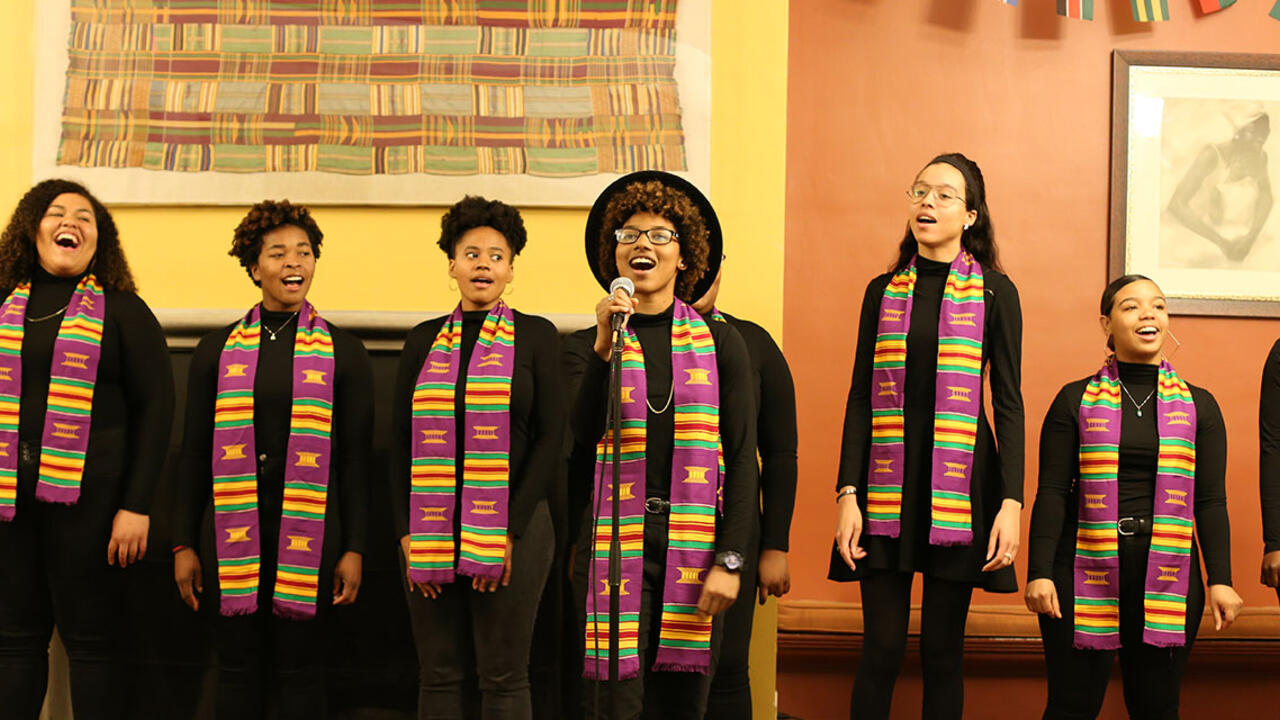New Voices Restore a Harambee House Tradition

Ethos, the largest and oldest organization at Wellesley for students of African descent, was officially established in 1968. The Ethos gospel choir came soon after, as students sought an opportunity to come together and search for social and artistic outlets. “I understand that in its inception, most members of Ethos also participated in the choir,” says Tracey Cameron, assistant dean of intercultural education and director of Harambee House, whose mission is to provide a central location to meet the needs of Black students including studying, tutoring, and social events, while also serving as a cultural resource for Black heritage to enlighten the college community at large.
Reestablished this year as the Harambee Singers, the choir wants to revive that sense of community. The group came together for its first practice session in early February and meets each Tuesday evening under the direction of Linda Brown-San Martin ’70, one of the first directors of the Ethos Choir, who played a critical role in its resurgence in the 1990s. She says she is thrilled to have a part in this newest iteration of the group.
“It took me 40 years to realize God put me on earth to be a gospel director,” Brown-San Martin says. “This is what I do. This is who I am. To be back at Wellesley leading this is more than déjà vu. It’s deeper than that.”
The Harambee Singers’ debut performance on April 23 featured largely gospel selections, but Brown San-Martin wants to broaden the group’s repertoire to include hymns, contemporary Christian selections, Caribbean-influenced arrangements, and spirituals.
Unlike other musical organizations on campus, Harambee Singers does not require auditions. Currently, 11 students are in the choir, and Cameron expects that number to grow. “I’m really interested to see how the group evolves from here,” she says. “It’s important that we not just provide a space for students to express themselves, but also a space where they feel comfortable and feel a sense of belonging, regardless of religious affiliation. Coming here, being able to release that energy, from a wellness perspective, that’s important.”
The Ethos 50th anniversary fund is covering some of the costs associated with restarting the choir. “We are so grateful to have the 50th funds to contribute to making Wellesley a vibrant, supportive environment for our students,” says Sheilah Shaw Horton, vice president and dean of students. “We hope to ignite the sense of community and connection that the Ethos Choir created for alums.”
Moving forward, Cameron, Brown-San Martin, and the Harambee Singers want to engage with the Boston community and beyond, and find opportunities to compete and perform. They may even bring other collegiate gospel groups to Wellesley. “It would be wonderful to host a choir showcase at Wellesley,” Cameron says. “I think there’s a lot of potential.”
Jordan Bates ’22, one of the group’s new members, is similarly hopeful. “To me being in this choir is like being in a family. We are all very supportive of each other’s endeavors in and out of choir. I really hope that we can have more concerts and that the number of choir members increases next year!”
“There is empowerment that comes from people working together in harmonious expression, particularly in the arts,” Brown San-Martin says. “The word ‘harambee’ actually means working together.” She sees this group as a space for shared singing, laughing, crying, celebration, and expression of joy. “Love. Joy. Peace,” she says. “That’s what gospel music means to me.”
Photo: Left to right: Shania Baldwin ’21, Jill Foye ’22, Jordan Bates ’22, Jada Wiltz (front) ’22, Tatiana Moise ’21, Giselle Mota ’22, Adwoa Antwi ’21



